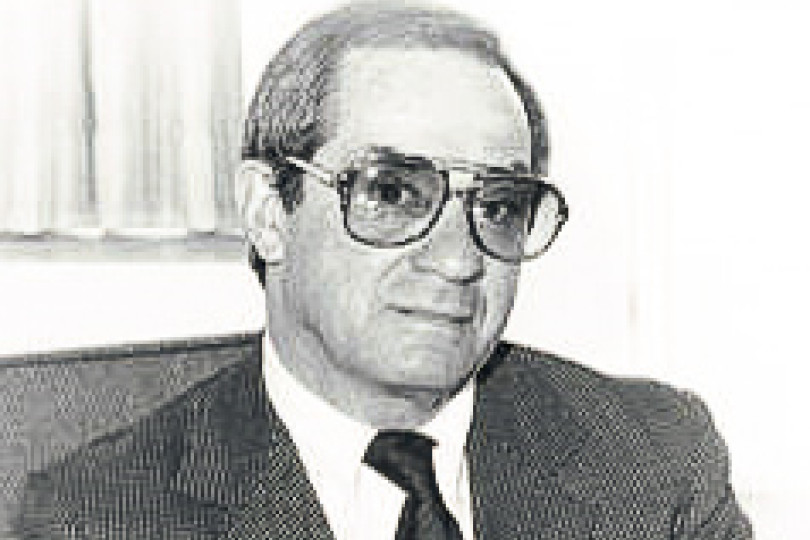By Maureen O’Donnell, © 2013 Chicago Sun-Times, reprinted with permission
HIS GOLDEN GLOVES fists helped him fight for his union — and feed his family.
Michael “Woody” Wood grew up in Humboldt Park, the oldest of four children of Russian and Polish Jews. His father worked for a clothing workers’ union.
Young Woody’s neighborhood was “a hothouse for gangsters,” according to a 1939 Chicago Daily News story. It produced outsized personalities and talents like movie-maker Mike Todd and authors Nelson Algren and Saul Bellow. Kids there learned to keep their wits sharp and their dukes up.
Woody found a haven at the Deborah Boys Club, then at 2441 W. Division. The club, founded by a Jewish women’s organization, was a refuge for him and the other wisenheimers and toughies looking for a place to belong.
Decades later, he named one of his children Deborah in honor of his home-away-from-home.
He read the books in the club’s library and played softball. And though he stood only about 5-foot-6 and weighed 145 pounds, the welterweight learned to box so well that he became a Golden Gloves fighter. The prizes from his bouts helped feed his family during the Great Depression. His skill in the ring also came in handy when he worked as an organizer for the boilermakers union.
Mr. Wood, 93, died Thursday [June 13] of cardiac arrest at Glenbrook Hospital in Glenview.
Despite his pugilistic expertise, family and friends recall him as an exceptionally kind and gentle man.
As an amateur boxer, he couldn’t take prize money. But fighters could accept a new watch. After a match, jewelers lined up to buy those timepieces, and the money helped pay the bills for Mr. Wood’s family.
The contests were marked by a raucous showmanship that was breathtakingly politically incorrect by today’s standards. Promoters drummed up interest by pitting ethnic groups against each other. At one of Mr. Wood’s bouts, he faced off against an Italian fighter who wore a Jewish star on the seat of his pants.
Mr. Wood trounced him. And, as he told it, for months afterward, every Jewish restaurant on Division Street fed him for free.
He was the kind of young man who always had a couple of jobs going. He rose at 4 a.m. to work on a bread truck, running in to stores and restaurants with deliveries, then heading to class at Marshall High School. At one point, he owned a hot dog stand that he called “MGM,” which stood for Many Good Mouthfuls.
During World War II, he joined the Navy, where he learned to swim. Sailors were taught to course through water on their backs to conserve their energy, and for the rest of his life Mr. Wood stayed in shape by swimming the backstroke several times a week at the Jewish Community Center on Touhy on the city’s far North Side or at the old Howard Johnson’s on Skokie Boulevard in Skokie. He also came back from the service with another skill: a killer game of gin rummy.
Mr. Wood met Gloria Janssens at a dance and married her. They were wed for 65 years.
He went to work at A. Finkl & Sons, a precision steel manufacturer. Soon, he landed a job with the International Brotherhood of Boilermakers, a union of blacksmiths, shipbuilders and manufacturing workers, among other professions. He worked as an organizer, bargainer, writing specialist and national chief of staff. He topped off his career by being elected an international vice president.
When he moved to the union’s headquarters in Kansas City, Kan., he singlehandedly integrated the office — and the women’s washroom — when he hired an African-American secretary. A group of white secretaries asked him where the woman would go to the bathroom.
Mr. Wood pointed down the hall to the women’s room and said: “Right there.”
“‘Then, where will we go to the bathroom?’ ” they asked.
He pointed to the same women’s room. “Right there,” he said.
During the heat of one organizing campaign, he punched a factory foreman, sending him to the hospital. Mr. Wood visited him there and told him: “You fell.”
The foreman actually liked Mr. Wood. “I fell,” he agreed.
“Mike was a strong leader, a tough guy but kind,” said Tom Balanoff, president of SEIU Local One.
In another campaign, Mr. Wood was trying to unionize a factory where workers were being exploited, said his son, Doug. He lay down on the factory railroad tracks to keep a train from leaving. As the anecdote was re-told over the years, the train got closer and closer, until it stopped only inches away.
He wasn’t just a man of muscle. When his wife and her friends gathered at the house for Mahjong night, Mr. Wood took his son to the movies, especially Charlie Chaplin films and foreign offerings by Francois Truffaut. “The Wild Child” was a favorite. He enjoyed the New Yorker; the works of Joyce Carol Oates and the Lyric Opera.
A dapper dresser, he liked to wear nice suits. In the 1960s, he sported the fashions of the era: peace medallions, bell bottoms and Nehru jackets.
A socialist at heart, he and his wife bought their first property, a Glenview condo, about a decade ago. He read everything he could on the Hollywood blacklist era that saw writers and directors frozen out of work and sent to prison for alleged Communist leanings.
In addition to his wife, Gloria, and son, Doug, Mr. Wood is survived by three daughters, Justine Schoor, Deborah Wood and Wendy Shure-Morell, and nine grandchildren.
Editor’s Note: IVP Michael Wood became a Boilermakers District Representative in 1957. He was appointed as an International Representative in 1961, Assistant to the International President in 1978, and Director of Organization and Education in 1983. He was elected International Vice President for the Great Lakes Section in 1986 during the 27th Consolidated Convention. IVP Wood retired in 1990.






